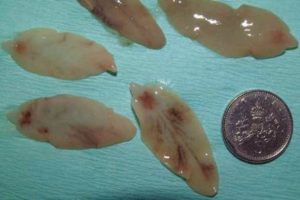Care When Grazing Fields Cleared Of Silage
23 August 2017Acute rumen fluke was diagnosed in autumn 2016 with three deaths from a group of 60, and other ewes leaner than expected. At post mortem large numbers of immature rumen fluke were detected in the small intestine.
For these cases to occur there has to be ingestion of massive numbers of immature rumen fluke. These ewes were on a silage aftermath but areas of wet ground were also present. The practice of putting grazing stock directly onto silage aftermaths after the fields have been cleared is a risk for acute liver fluke and rumen fluke infection as stock will graze more intensively on the wetter areas and field margins where tractors and machinery cannot travel. The risk of disease will usually be greater if the field has been grazed by sheep earlier in the year.
Oxyclozanide is the usual treatment for rumen fluke although the products have no licence claim against the parasite. It is not effective against the juvenile stages of liver fluke.
Acute rumen fluke remains very uncommon. Liver fluke is the more important parasite in terms of disease and production loss and routine autumn treatments should continue to specifically target immature liver fluke.
Heather Stevenson, heather.stevenson@sac.co.uk
Sign up to the FAS newsletter
Receive updates on news, events and publications from Scotland’s Farm Advisory Service

